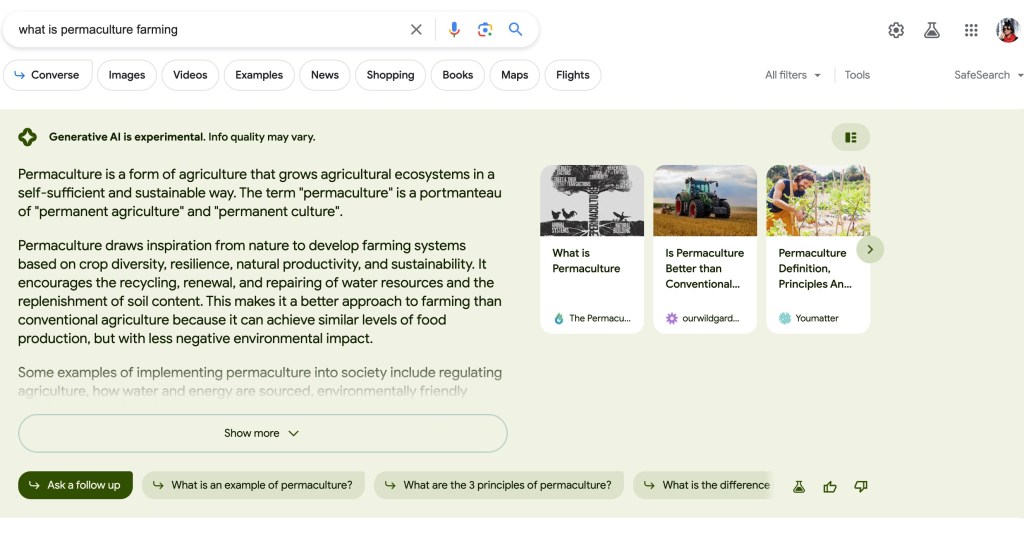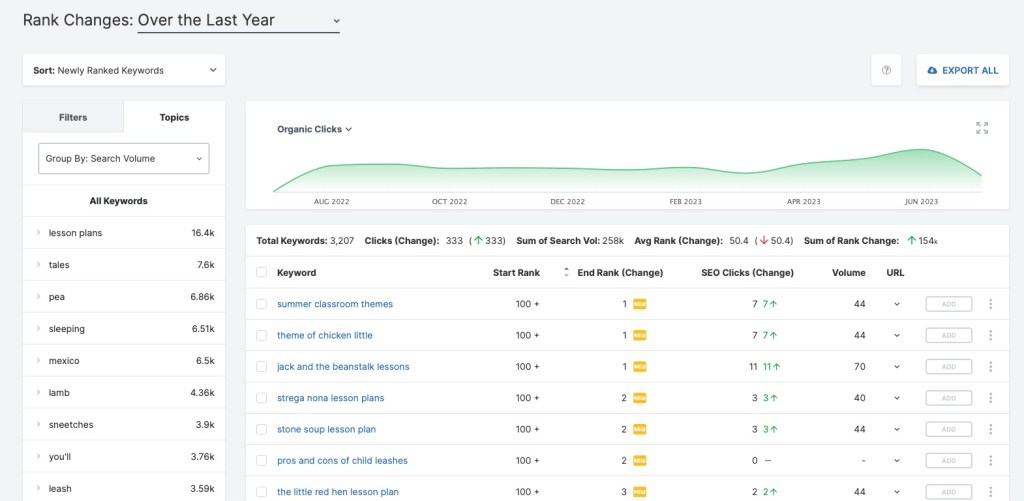Your cart is currently empty!

Lost Web Traffic? Celebrate!
We’ve been seeing falling web traffic at a lot of web sites. While we’re not actually ready to celebrate, it’s becoming increasingly obvious that this is something bigger than normal traffic fluctuations. Looking at all the changes we’ve seen recently in search behavior, — including generative AI search like Google’s Bard and Bing’s Sydney as well as the changes Google has been announcing and the rise of no-click searches — we’re beginning to see that traffic is not the simple metric it used to be.
No-click searches
This is one of the biggest factors. Semrush says that more than one quarter of internet searches now do not lead to clicks through to a website.
Here’s what that means.
In the past, a person feeling concerned about a health issue would search for that problem — for example, “I’m tired all the time” or “fatigue.” The average individual searching for help with a health problem would visit about 10 different websites. In our example, they might read a blog post about being tired all the time, an article distinguishing between fatigue and drowsiness, a couple of posts about causes and treatments for fatigue, and some tips on how to increase energy. In the course of that reading, they’ll encounter a couple of ideas that they think might help them. Researching these ideas further, they may decide to look into yoga, tai chi, and health coaching. Deciding that health coaching sounds good, they visit a couple of health coach’s websites before booking a call with one.
That’s ten sources of information. If your health coaching site showed up in the early stages of the search, you would already have established a connection by the time this person decided to look for a health coach. What’s more, if they visited your website a couple of times early in their search, Google will be more likely to show it to them later when they search for a health coach.
That may still be a typical process. However, some people will now start with a visit to ChatGPT or Google Bard, which could get them to the point of comparing treatments faster. Bard will offer the same kind of basic information they might have found at a doctor’s blog, and might also suggest some local physical therapists and health coaches. Bard also said, when we tested it, “You can also search for ‘health coaches in Fayetteville, AR’ on Google. This will bring up a list of health coaches in the area, along with their websites and contact information.”
They might jump to Google search at this point and look for a health coach — but you had no chance to reach them at an earlier stage of search.
Still another person might go to Google.com with those searches in the beginning, but see enough information to answer their question or to send them off on a different search. Our example searcher might see the SERP below and decide to see a doctor, to follow up on the suggestion of yoga, or to give up those after-dinner espressos. No clicks required.

In fact, Google is trying out some AI-assisted search on the regular SERPs now, as shown in the screenshot below.

New metrics
Thinking about these variations on search behavior should show that you could have lower traffic if your target market changes search behavior. That searcher could still end up at your website making an appointment, but without preliminary visits to your blog — or they might just call your number from the search engine results page, never having visited at all.
The screenshot below shows our lab site on the Google Search Console. Where in the past we might have focused on total clicks more than anything else, it might now make sense to work on increasing total impressions and improving our click through rate (CTR).

GA4, the new Google Analytics, is much more geared toward catching conversions. Where in the past we would most want to see our traffic increasing steadily, now we might want to make sure we have a conversion point on every page. That might allow us to track visitors more accurately.
We should also focus on rankings. If searchers aren’t scrolling down the page to see more articles, then we really want to make sure that we are at the top of the page as often as possible.
Search Console will tell you the terms you’re ranking for, and tools like Spyfu will give you rankings. You can see their estimates for our lab site in the screenshot below.

This is also a good time to think about ads. Paid search can bring conversions without clicks, allowing visitors to call or book appointments directly from the search engine results page.
Keep up
Your response to this change doesn’t need to be despair. Here are some points to consider:
- Even in no-click searches, your position in the SERPs matters. In fact, it may be even more important. People used to read an article and use what they learned there to refine their search. Some still do, but the no-click searches focus on those few options at the top of the page. Make SEO a priority.
- Get familiar with the metrics that reflect the new style of search. As the old saying goes, you only improve what you measure. Make sure you’re measuring rankings and impressions, not just traffic.
- Traffic increases continue to be a good sign of the overall health of your website, and certainly they are still a good thing. Just don’t rely on them to provide quick strategy decisions.
Do you need help determining your web goals, developing strategies to meet those goals, and carrying out your strategies? Haden Interactive can help.

Leave a Reply